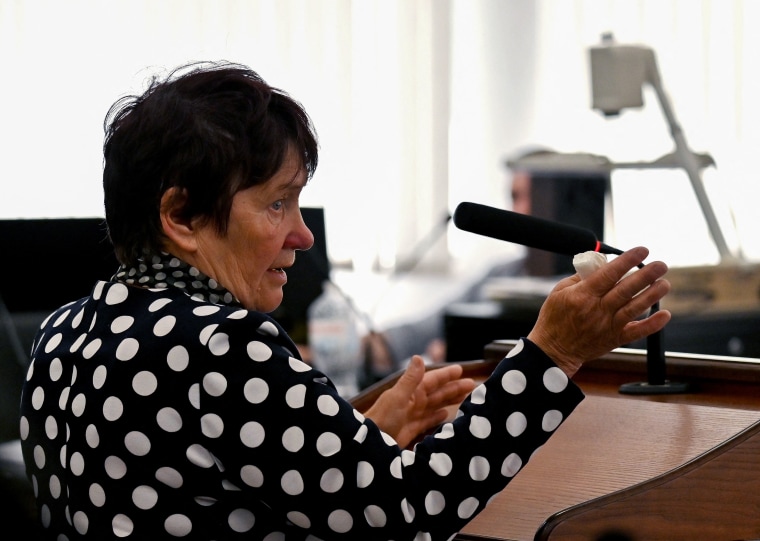By Yuliya TalmazanNBC
News
A Russian soldier was sentenced to life in prison on Monday for killing an unarmed civilian, in the first war crimes trial since the invasion began three months ago.
The verdict ends days of proceedings in a kyiv court and could set the stage for a series of other trials for alleged atrocities committed by Russian forces during the conflict.
Sergeant Vadim Shyshimarin, 21, pleaded guilty to violating the laws and customs of war under a section of the Ukrainian criminal code, after admitting to shooting an unarmed 62-year-old man in the head in a northeastern town. of Ukraine in the first days of the war.
[“It's Not Easy”: The Odyssey of US Families Hosting Ukrainian Refugees Fleeing the Russian Invasion]
The sentence enters into force in 30 days and can be appealed during that period.
The soldier, a member of a tank unit who was eventually captured, will remain in custody.
The case drew international attention amid mounting accusations of war crimes committed by Russian forces in Ukraine, some of which have been documented by international human rights organizations.
President Zelenskyy receives a delegation from the US Senate.
May 15, 202200:22
Ukraine has launched a massive effort to prosecute alleged war crimes on its territory, while both the International Criminal Court and the United Nations have also launched separate investigations.
The attention paid to the case also highlights its unusual nature, as it involves a captured soldier being tried in the country that its armed forces invaded in the midst of war.
A "historical narrative"
Dressed in a blue and gray tracksuit and with a shaved head, Shyshimarin was subdued throughout the trial, sitting in a glass booth that separated him from the rest of the courtroom.
The youthful-looking soldier had the help of a translator who helped him interpret the proceedings, conducted in Ukrainian, through a narrow opening in his cabin.
During the witness statements, he stood with his head bowed to listen to the translator and his hands behind his back.
[Ukraine declares the end of the battle for Mariupol and cedes control of the key port city to Russia]
He spoke in court last Thursday to say he fired the fatal shot under pressure from officers.
He initially disobeyed his commanding officer's order to shoot the unarmed civilian, he said, but eventually did so when another repeated the order.
He confessed that what he did was "unacceptable" and apologized to the victim's wife.
His defense argued that the officers he said pressured him into complying with the order and his superiors should be in the dock, not Shyshimarin.
In announcing the verdict on Monday, the presiding judge said Shyshimarin was well aware that the victim was a civilian and did not have to comply with what he called "a criminal order" to shoot him.
Kateryna Shelipova gestures as she testifies about her husband Oleksandr's death against captive Russian soldier Vadim Shishimarin during the second day of his war crimes trial for killing a civilian, at a court in kyiv on May 19, 2022. Sergei Supinsky / AFP via Getty Images
Although Shyshimarin pleaded guilty last Wednesday, he had a full trial, in which the court examined the evidence and heard from the victim's wife, Shyshimarin himself and several other witnesses.
Experts said it was critical for Ukraine to expose the evidence for the Ukrainian public and the world to see.
[McDonald's announces its total withdrawal from Russia, after more than 30 years in the country]
"I think it's important for them to try to establish not only guilt, but also to establish what has happened," said Dapo Akande, a professor of international law at the University of Oxford.
"They're trying to create a kind of historical narrative that 'this is what happened, and we want to show it to the world."
Shyshimarin's case will likely lay the groundwork for Ukraine to prosecute more war crimes cases in the future, Akande said.
“I imagine Ukraine will see this as the first in a series of trials it hopes to hold over the next few years.
And it will be years, I think,” she added.
Russian Army Sergeant Vadim Shishimarin appears at a sentencing hearing on May 23, 2022 in kyiv, Ukraine. Christopher Furlong / Getty Images
Ukrainian Prosecutor General Iryna Venediktova stated in mid-May that there were more than 11,000 ongoing war crimes cases in Ukraine, with 40 suspects already identified.
With Shyshimarin's trial, he said Ukraine is sending "a clear signal that all perpetrators, all persons who ordered or assisted in the commission of crimes in Ukraine will not avoid responsibility."
[“There can be no bigger lie”: Putin tries to justify his invasion of Ukraine with falsehoods]
The Kremlin has sought to distance itself from Shyshimarin's case, saying it did not have much information about the trial and had "very limited" ability to help him.
He has called any suggestion that Russian troops have committed war crimes in Ukraine “unacceptable” and staged.
Although the circumstances of the trial are unusual, experts believe there has been nothing wrong with the Ukraine trial.
"A prisoner of war cannot be prosecuted for a lawful act of war," said William Schabas, a professor of international law at Middlesex University in London.
"But he is being prosecuted for a war crime," he recalled.
Although Shyshimarin is a low-ranking soldier, the fact that his trial is moving forward may help establish much of the jurisprudence and principles surrounding future war crimes cases of the conflict, such as occurred in the former Yugoslavia in the 1990s. 1990, according to Akande.

